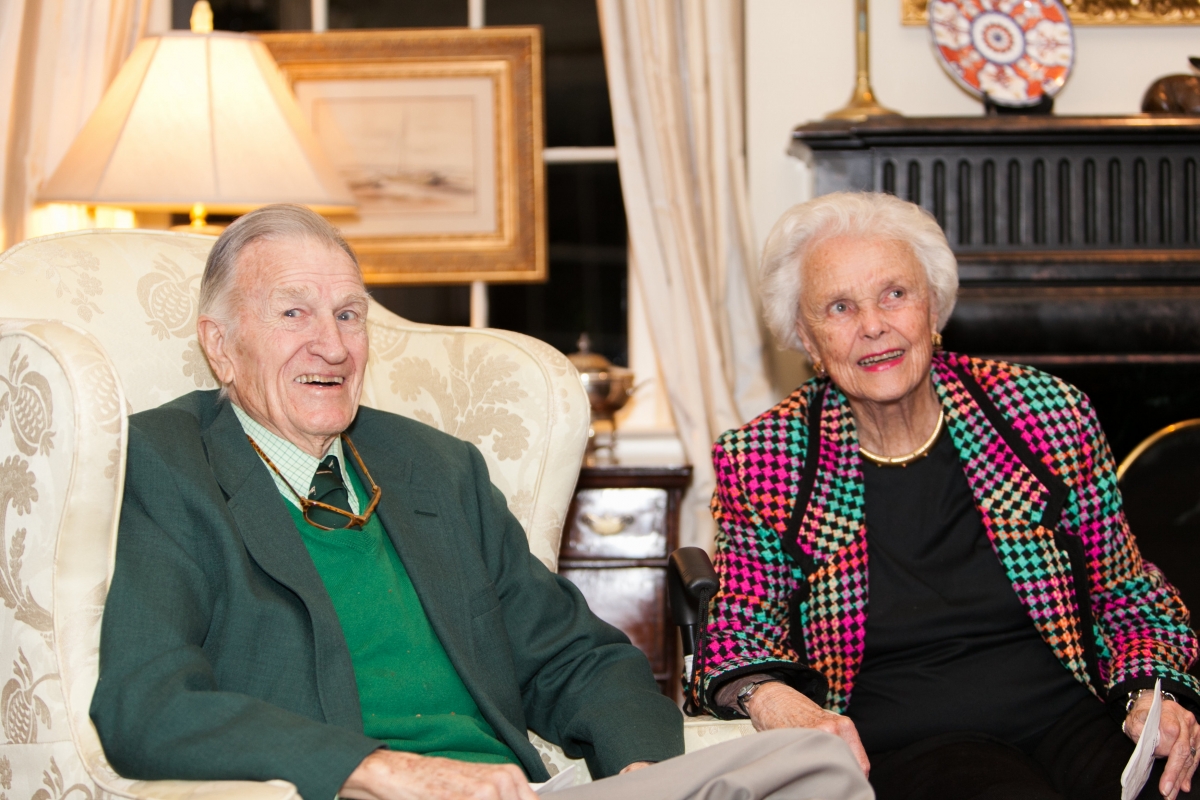The Tocqueville Society of the River Region United Way proudly recognizes Truman and Joyce Hobbs as the 2012 recipients for their dedication, compassion and lifetime of philanthropy to our community.

This year’s Tocqueville Society Award could serve as a lifetime achievement award for two people whose philanthropy has illuminated the darkness even as they shunned the spotlight. Judge Truman and Joyce Hobbs, by adherence to the enduring values instilled in them by their parents, set their lives on a course to do the right thing and have excelled, to Montgomery’s great benefit.
Son of Selma
Born in 1921, Truman Hobbs grew up in Selma, Alabama, the son of Sara and Samuel Francis Hobbs, whose work as a lawyer, circuit court judge and a United States Congressman, influenced Truman’s predilection for public service. At a young age, Truman learned from his father’s public opposition to the Ku Klux Klan. Watching the Depression grind people into poverty beyond their control evoked compassion for his fellow man. These formative experiences later found expression in Judge Hobbs’ “abiding and deep devotion to the civic good and (his) nearly overpowering sense of civic responsibility.”
 Following high school in Selma, Truman matriculated at the University of North Carolina. As he let his son out of the car, Congressman Hobbs told Truman he wanted him to make Phi Beta Kappa, because “making Phi Beta Kappa will open doors for you.” He credits his father’s expectation and encouragement with his achieving this preeminent ranking. Truman was also elected student body president and won the school’s award for the varsity athlete with the highest scholastic average. He was poised to swim for the United States in the Olympics when World War II diverted him to service in the Navy, where he was decorated for heroism.
Following high school in Selma, Truman matriculated at the University of North Carolina. As he let his son out of the car, Congressman Hobbs told Truman he wanted him to make Phi Beta Kappa, because “making Phi Beta Kappa will open doors for you.” He credits his father’s expectation and encouragement with his achieving this preeminent ranking. Truman was also elected student body president and won the school’s award for the varsity athlete with the highest scholastic average. He was poised to swim for the United States in the Olympics when World War II diverted him to service in the Navy, where he was decorated for heroism.
On the day that World War II began, a bear broke into a tent occupied by Joyce Cummings and her two sisters, while they were camping with their parents. Running to safety, young Joyce was undeterred in her passion for nature and animals. Participating in choir at an early age kindled a lifelong appreciation of music. Joyce learned about philanthropy by observing her parents and grandparents’ generosity.
Her childhood in a Chicago suburb was shaped by family and by the times: “We were supposed to do well academically; we were supposed to do well athletically. We had a good time, but we behaved ourselves.”
Romance at Vassar
At Vassar College, Joyce pursued a major in political science, with a special interest in international studies. It was at Vassar that she met Truman, who by then was at Yale Law School. Finishing at the top of his class, Truman went to Washington to clerk for Supreme Court Justice Hugo Black.
 At the conclusion of his clerkship, Truman and Joyce married and settled in Montgomery. Theirs was very much a 1950s marriage in which Truman pursued his legal career and Joyce was in charge of the children and the home. The unfailing mutual respect and loyalty the couple exhibited for one another and for their family in an understated but indelible way created the stability required for the development of the strong character found in their children Emilie, Frances, Dexter and Truman Jr. - who, from an early age learned from their parents how to live in a philanthropic way.
At the conclusion of his clerkship, Truman and Joyce married and settled in Montgomery. Theirs was very much a 1950s marriage in which Truman pursued his legal career and Joyce was in charge of the children and the home. The unfailing mutual respect and loyalty the couple exhibited for one another and for their family in an understated but indelible way created the stability required for the development of the strong character found in their children Emilie, Frances, Dexter and Truman Jr. - who, from an early age learned from their parents how to live in a philanthropic way.
From 1949 to 1980, Truman was in the private practice of law. During that time, he served as President of the Montgomery State Bar Association and the Alabama State Bar Association.
To members of his firm, he is “Everyman’s Sage,” possessing a “brilliant mind combined with the nicest, most genuinely kind and unassuming personality imaginable.”
A Respected Attorney and Judge
Regarding law as a calling, Truman consistently reached out to new attorneys and would listen to clients no one else would take. He is known for treating everyone equally, with dignity, kindness and respect, regardless of age or station. He is lovingly regarded as having the most generous soul, not only for the financial support he gives, but as importantly, for giving so generously of himself.
In 1980, President Carter appointed Truman as Judge of the United States District Court for the Middle District of Alabama, which he served as chief judge from 1984 – 1991. At his investiture, Judge Hobbs was characterized as a man of unquestionable integrity and the most popular lawyer in Alabama.
“The General”
The Hobbses share a deep pride in Montgomery and desire to see it thrive. Once her children reached school age, Joyce translated her interests into community service. She has been an active member of the boards of the State Department of History and Archives, Montgomery Chorale, the Montgomery Symphony, Nature Conservancy, Goodwill, Children’s Center and The Montgomery Academy. She served as President of the Montgomery Junior League, Colonial Dames, Landmarks, Women of the Church of the Ascension, the Vestry of the Church of the Ascension and the Montgomery Zoo. Notably though not surprisingly, both she and Truman served as President of the United Way Board.
Whether in her own home or in the home of a friend who is ill, Joyce is known for rolling up her sleeves and making good things happen. She doesn’t talk about doing things. She does them, and then without fanfare, moves on to her next meeting, to gardening or to making crosses for Palm Sunday. Her fierce love of family and her take-charge character have earned her the affectionate moniker, “The General.”
A Legacy of Service In their charitable giving as in their community work, Truman and Joyce have pursued causes that resonated with their experiences. After Judge Hobbs contributed funds to buy and staff a mobile reading laboratory for the Montgomery Public Schools, he said, “’ If a child can’t read in the first grade, he gets to be a lost ball. He can’t progress and he becomes a behavioral problem.’” A principal of a local elementary
In their charitable giving as in their community work, Truman and Joyce have pursued causes that resonated with their experiences. After Judge Hobbs contributed funds to buy and staff a mobile reading laboratory for the Montgomery Public Schools, he said, “’ If a child can’t read in the first grade, he gets to be a lost ball. He can’t progress and he becomes a behavioral problem.’” A principal of a local elementary
school remembers Judge Hobbs dropping by the school one day to leave a check for whatever the school needed. The principal had not known he was coming to her school and knew that his discreet giving would not stop at her door.
Like their parents, Truman and Joyce Hobbs have transmitted their values to their children by example. Their daughter, Emilie and her husband Bruce Reid, daughter, Frances and husband William “Rip” Rose, son, Dexter, who was lost at a very young age to cancer, and his wife, Nan, now married to Ron Barganier, and son Truman and his wife, Debbie have all followed in their parents’ soft steps and are known for having a meaningful impact in a quiet way. Their eleven grandchildren call Truman, “Atticus Finch,” and regard their grandmother as the most interesting character of all time. Truman and Joyce have five great granddaughters.
Their son, Judge Truman Hobbs, Jr. says that his father’s stories tell his values and what matters to him. Like his father’s echo, the younger Truman said, “Every child wants to please his parents. I still want to come home and put a smile on their faces.”
And to the couple who would most seek to avoid recognition, The Tocqueville Society gives you its award for lifelong inspiring dedication to family, constant commitment to distinguished service and extraordinary philanthropy to your grateful community.
With special appreciation to Laurie Jean Weil and Emilie Reid.
